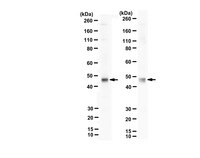ABS2113-100UG Sigma-AldrichAnti-Vaccinia related kinase-1 Antibody, N-Terminus
Anti-vaccinia related kinase-1, N-Terminus, Cat. No. ABS2113, is a rabbit polyclonal antibody that detects Serine/threonine-protein kinase VRK1 (vaccinia related kinase 1) and has been tested for use in ELISA, and Western Blotting.
More>> Anti-vaccinia related kinase-1, N-Terminus, Cat. No. ABS2113, is a rabbit polyclonal antibody that detects Serine/threonine-protein kinase VRK1 (vaccinia related kinase 1) and has been tested for use in ELISA, and Western Blotting. Less<<Recommended Products
Overview
| Replacement Information |
|---|
Key Spec Table
| Species Reactivity | Key Applications | Host | Format | Antibody Type |
|---|---|---|---|---|
| H | ELISA, WB | Rb | Purified | Polyclonal Antibody |
| References |
|---|
| Product Information | |
|---|---|
| Format | Purified |
| Presentation | Purified rabbit polyclonal antibody in buffer containing 50 mM KCl, 25 mM HEPES (pH 7.6), 10% glycerol, 0.1 mM EDTA, 0.01% NP40 with 0.05% sodium azide. |
| Physicochemical Information |
|---|
| Dimensions |
|---|
| Materials Information |
|---|
| Toxicological Information |
|---|
| Safety Information according to GHS |
|---|
| Safety Information |
|---|
| Packaging Information | |
|---|---|
| Material Size | 100 μg |
| Transport Information |
|---|
| Supplemental Information |
|---|
| Specifications |
|---|
| Global Trade Item Number | |
|---|---|
| Catalogue Number | GTIN |
| ABS2113-100UG | 04054839460050 |
Documentation
Anti-Vaccinia related kinase-1 Antibody, N-Terminus SDS
| Title |
|---|
Anti-Vaccinia related kinase-1 Antibody, N-Terminus Certificates of Analysis
| Title | Lot Number |
|---|---|
| Anti-Vaccinia related kinase-1, N-Terminus Polyclonal Antibody | Q3021053 |








